I live near one of the most popular recreational roads in America – the Blue Ridge Parkway. So I see a lot of recreational vehicles. And lately, I’ve been seeing lots of Benz Sprinters.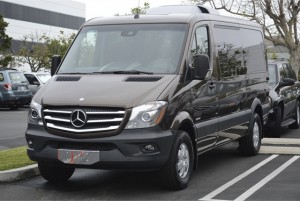
Nominally, it’s a commercial van – in the same class (and useful for the same purposes) as the Nissan NV van (and the new Ram ProMaster van). But what differentiates it from those utilitarian appliances is that it’s also nice. The difference between a plain white ‘fridge – and a stainless steel SubZero.
Not everyone needs the extra niceness, of course.
But it’s nice that it’s available.
And because it starts out nicer – even in the basest of trims it’s still a Mercedes, after all – it is a much sounder basis for an RV conversion. Big, but not too big. A step down from a Winnebago, footprint-wise. But – potentially – a lot ritzier (and more manageable) as a home on wheels. The almost cab forward layout, for instance – which I’ll get into more below.
And then there’s the other side of the coin – the utilitarian side. The Sprinter is taller inside than the competition – so you can fit more things more easily inside than in the competition.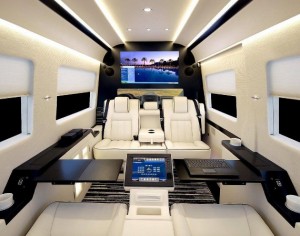
It also comes standard with a diesel engine (unavailable at all in the Nissan NV, which comes only with thirsty and thirstier gas engines). And it’s heavy duty, built on a rear-wheel-drive layout (unlike the FWD Dodge Ram ProMaster, which is based on the European Fiat Ducato).
Naturlich, there is a price to be paid – literally.
The Sprinter’s base price is about $8-$10k higher than the base prices of its plebian-badged rivals and loaded, it can easily knock on $50k.
After all, it is a Mercedes.
WHAT IT IS
The Sprinter is a very large (up to 12 passenger) commercial/utility van, available in two lengths (144 and 170 inch wheelbases) and tall – or taller – roof heights.
Base price for the 144-inch standard wheelbase Cargo Van equipped with 2.1 liter turbo-diesel four cylinder engine and seven-speed automatic is $35,920.
A top-of-the-range 2500 “High Roof” Sprinter riding on the 170 inch wheelbase and with a more powerful turbo-diesel 3 liter V-6 under the hood lists for $45,000.
The other two vehicles in this class are the Nissan NV, which starts at $26,000 and tops out at $31,470 for a “High Roof” 2500 with V-8 (gas) engine – and the new Dodge Ram ProMaster van, which arrives in the U.S. courtesy of the Chrysler-Fiat partnership. It starts at $28,630 – and tops out at $36,150 for an “extended length” model.
WHAT’S NEW
The Sprinter’s standard-equipment turbo-diesel engine is now a more fuel-efficient four; the turbo-diesel V-6 remains available as an optional upgrade.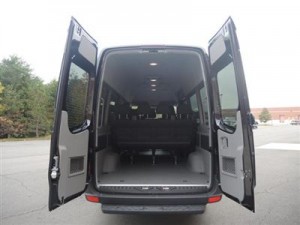
Exterior and interior styling has been tweaked slightly and there are new electronic features, including Load Adaptive stability control (standard on all trims) and Crosswind Assist (also standard) which automatically stabilizes the vehicle if it’s struck by a (you guessed it) crosswind that might otherwise push it out of its lane.
There is also an upgraded 5.8 inch flat screen display (standard equipment) and a Becker MAP PILOT navigation system (optional) that can be moved from one Sprinter van to another, a cost-saving feature for fleet users.
WHAT’S GOOD
By a wide margin, the nicest “commercial” van of the three.
Easiest to drive non-commercially of the three.
Standard diesel engine gives decent economy and stout pulling/hauling power.
RWD layout is inherently rugged and better for serious work (Sprinter can pull 7,500 lbs. vs. 5,100 lbs. for the ProMaster).
A great starting point for a custom RV or high-line mini-bus.
By a wide margin, the most expensive of the three.
High sticker price relative to rivals negates much of the diesel’s efficiency advantages (though doesn’t chink its strong down-low pulling power and probably superior longevity).
The cupholders are precarious; a center console storage area in between the driver and front passenger seat is desperately needed.
Like all these vehicles, the thing is still a bus. It’s a lot to deal with. And will not fit in a standard house-type garage.
UNDER THE HOOD
The Sprinter’s the only vehicle in this class that comes standard with a diesel engine (which is nice, given the price) with another diesel optional.
Nissan doesn’t offer one at all in the NV van (it’s available with either a gas 4 liter V-6 or a gas 5.6 liter V-8) and it’s extra-cost in the ProMaster, which comes standard with Chrysler’s 3.6 liter gas V-6.
For 2015, the standard Sprinter diesel is a fairly small 2.1 liter unit, but courtesy of “two-staged” turbocharging, it produces 265 ft.-lbs. of torque at 1,400 RPM. This is a bit more torque than the ProMaster’s standard 3.6 liter gas V-6 (260 ft.-lbs.) and a bit less than the Nissan NV’s 4.0 liter gas V-6 (281 ft.-lbs.) however, the torque peaks much sooner – which is what you want in a big, heavy vehicle meant to haul and pull stuff. The NV’s gas V-6 doesn’t make its peak torque until 4,000 RPM; the Dodge’s V-6 has to rev up even higher, to 4,175 RPM.
Benz pairs the new turbo-diesel four with a seven-speed automatic – an upgrade over the Nissan’s five-speed and the Dodge’s six-speed transmission.
The next-up Sprinter engine is an also-turbo’d 3 liter diesel V-6. It ups the hp ante to 188 (from the 2.1’s 161) and the torque to 325 ft-lbs. – more torque than all the competition’s available engines except the Nissan’s NV’s optional 5.6 liter (gas) V-8.
The 3.0 V-6 is paired with a five-speed automatic.
All Sprinters are rear-wheel-drive.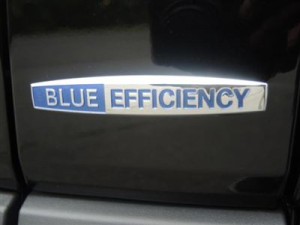
Mileage figures are not published – officially, by the EPA – for vehicles in this gargantuan class, but the Sprinter with 2.1 liter engine runs in the ballpark of 25 MPG on average, in mixed use (city/highway) driving according to my informal test-drive calculations. After a week of daily use, I still had just under half the 26.4 gallon tank of fuel I started with.This is very, very good for a vehicle this large, which has the aerodynamics of a double-wide combined with the curb weight of a full-size SUV plus a compact car. The Sprinter’s mileage is actually better than my ’02 Nissan Frontier pick-up (a compact pick-up with a four cylinder gas engine and manual transmission) delivers.
The Nissan NV van’s numbers aren’t published, either – but to get an idea, consider that the Titan pick-up on which the NV is based rates a suck-a-licious 13 city, 18 highway with the same 5.6 liter V-8 that’s optional in the NV. So, probably, the same engine in the much heavier – and far less aerodynamic NV – will almost certainly be in the single digits in the city and low teens on the highway. The NV’s 4.0 liter standard 4.0 gas V-6 is not likely to do much better, either. (In the much smaller – and much lighter – Frontier pick-up, the 4.0 V-6 rates 16 city, 22 highway).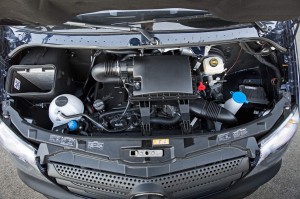
The Dodge does better – when equipped with its optional 3 liter turbo-diesel four. It’s mileage is probably as good – maybe even better – than the Sprinter 2.1’s. But, there is a catch. Though the ProMaster looks like a truck, it’s built more like a car – on a front-wheel-drive chassis. It can’t haul or tow nearly as much as the truck platform-based RWD Benz, which touts a very strong 7,500 lb. max tow rating, far more than the Dodge’s maximum of 5,100 lbs.
The Nissan NV is king of the hill on towing, though. When ordered with its optional V-8, this beast can pull nearly 10,000 lbs.
A note on diesel power:
First, even though the Sprinter is a “commercial” vehicle, you’ll still be stuck feeding it diesel exhaust fluid (DEF) periodically, to satisfy the Emissions Gods. Pretty much everything that’s a diesel that’s not an old tractor now requires DEF. There is a separate tank that has to be topped off – and which can run low or empty. When that happens warning lights illuminate at first and later (if you ignore the lights and don’t top off the DEF tank) the vehicle’s ECU – the computer brain that controls everything – will get progressively more recalcitrant, eventually preventing you from starting/driving the vehicle until you top off the DEF.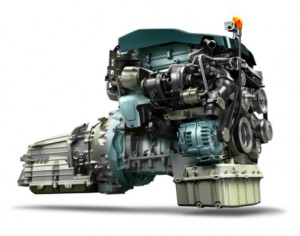
The other issue is the cost of diesel fuel vs. the cost of gas – which as I type this review in late fall of 2014 is lower than it’s been in years. It’s also a lot lower than the cost of diesel, which – in my area – runs about 50 cents more per gallon than regular unleaded. This definitely eats into the cost-per-mile ownership costs of the Sprinter, especially given its much higher price to buy.
However, being a diesel (and being built on a heavy-duty platform) it’s a good bet the Sprinter will last longer – and rack up a lot more miles – before it needs to be retired.
Food for thought.
The Sprinter is easier to drive than you’d expect it to be – given its size. This is perhaps its chief draw – or at least, one of them. It’s a vehicle you can drive almost anywhere – unlike say a Winnebago. It will fit in a standard-size outside parking spot – although just barely. The “cab forward” layout – the front clip is very short relative to the length of the vehicle; the driver sits only slightly setback from the front axle centerline – makes it seem less huge from the driver’s point of view and fairly precise maneuvering in close quarters is easier relative to the NV – which has a truck-like snout that extends much farther forward. The Sprinter’s no Smart car, but it could feasibly be driven – and parked – most places you could drive a Smart car, including a Starbucks parking lot.
Forget parking a Winnebago there.
The size of the thing manifests mostly as length – and height. It is a climb to get in – and down – even for a six-footer (me). Strangely, there are no grab handles for the driver or front seat passenger. The not-young/not-coordinated/those with bad knees will have issues. Interestingly, Mercedes provides acceptable access for the rear passengers via an automatically folding out running board step that comes out whenever the side slider is opened up.
The height also affects the ride.
Especially when it is windy.
What you’re dealing with here is something with the side profile of a super-sized UPS truck. Which is probably why Mercedes added that Crosswind Assist feature as standard equipment. It’s needed. That – and both hands firmly gripping the wheel. A sudden gust of wind can push the slab-sided Sprinter halfway across the double yellow – or halfway onto the shoulder. It’s a function of the shape and Benz has done what can be done to mitigate the problem. Like any specialty vehicle, the Sprinter’s extra capabilities entail certain limitations in other areas. Driven with respect for the vehicle’s susceptibilities – there ought to be no problems.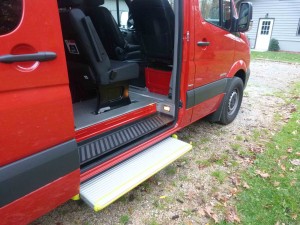
I test drove a Sprinter with the standard 2.1 liter turbo-diesel, which did an impressive job (given its size) motivating the Sprinter (given its weight – 5,071 lbs. empty for the standard wheelbase version). Wind resistance limits maximum speed to just under 85 MPH, but it gets there in good time and there’s enough power available to hold a steady 70-75 (current highway traffic flow) without struggling. Amazingly, it did not feel top-heavy in the curves – even when driven into those curves at speeds a few notches above the recommended speed. The Sprinter objected less to lateral movement than the last G-Class I drove a few years back. That one did feel top-heavy in the curves – at below recommended speeds.
At lower/non-highway speeds, the diesel burbles quietly, its low revs (and low noise output) contributing to a pleasantly noncommercial truck driving experience. Being a Mercedes diesel, the Sprinter is quieter than others, whether a function of the engine itself or the insulation built into the body.
All the controls are grouped within easy reach of the driver, including the gear selector, which is mounted stalk-style just to the right of the steering column. The huge frontal (and side) glass area provides superb visibility – and a panorama view of the world outside. The view to the rear is somewhat limited by the sheer length of the vehicle as well as the design of the rear doors, which are dual Dutch door-style. The metal “T” bracing of the door glass obstructs the view slightly, but Benz addresses this with an excellent close-circuit back-up camera and a pair of huge outside (door mount) rearview mirrors.
What sucks, then?
The cupholders. The two located in a flimsy fold-out tray below the audio and climate controls on the center stack are shallow. Round a curve – or hit a pothole – and your Starbucks grande may topple. Mine did. Fortunately, there are also cupholders built into the top of the dash for both the driver and front seat passenger. Use these.
Please.
The absence of a center console between the driver’s seat and front passenger seat. While Benz has thoughtfully designed in a top-of-dash storage compartment for a clipboard and a “tray” embedded into the dash above the main gauge cluster, there is a surprising lack of contained storage space in the Sprinter. If you put say a sack of groceries on the floor in between the driver and front passenger seat (or even in the footwell ahead of the front passenger seat) your stuff is guaranteed to spill and roll all over, leaving you to hunt for each item whenever you get were you’re headed. There’s oceans of space inside the Sprinter. It’s just a matter of compartmentalizing some of it.
AT THE CURB
The Sprinter – in standard wheelbase form – is actually the least-long of the three vehicles in this class. At 233.3 inches overall, it is 2.7 inches shorter than the Dodge ProMaster (236 inches ) and seven inches shorter than the Brobdingnagian Nissan NV (240.6 inches).
But the measurement that really stands out is the height – especially relative to width.
The Sprinter is the skinniest through the hips – 78.4 inches wide vs. 82.7 for the Dodge ProMaster and 79.9 for the Nissan NV. But its standing height – “Tall Roof” versions – is 76.4 inches. Tall enough for a 6 ft. 3 inch man to stand upright inside. Neither the NV nor the Dodge have as much walking around room as the Benz. And the because the Sprinter’s not as thick, it doesn’t seem quite as oversized, despite its 12-passenger capacity.
But the biggest difference is the obvious one. The Sprinter is a Mercedes-Benz and as such, is a step above, both literally and figuratively. It is the only one of the three that – as it sits – is other than purely utilitarian. Or rather, which you might want to turn into something other than a delivery truck, jitney bus or contractor vehicle. I’ve yet to see an NV or ProMaster turned into a mini-me Madden mobile. But I routinely see Sprinters – fully fitted out – serving as homes away from home, trundling along the Blue Ridge Parkway, their interiors as swank as many 5 star hotel suites. And – key point – it was not necessary to remake the factory dash, which is already comparable to what you’d find in other Mercedes passenger vehicles. The interiors of the NV and ProMaster have more in common with FedEx trucks. Not that there’s anything wrong with that.
THE REST
Of course, that three-pointed-star and all that goes with it isn’t free. No should it be. There’s the intangible of status, but – as noted above – you are also getting the very tangible higher-line experience. A nicer, not blue collar, interior. More sophisticated equipment, too – viz, the suite of electronics, including the Crosswind mitigator and Load Adaptive stability control. A standard five-speaker audio system – not a mere radio with maybe two speakers (Nissan NV). And in addition to being classier – and better-equipped as it sits – the Sprinter can be ordered with optional amenities such as you’d expect to find available in, well, a Mercedes: Eight rear speakers, bi-xenon HID headlights, heated windshield, auxiliary rear heater for passengers, rear AC, sunroof, various alloy wheel/tire packages. None of these features are even available as options in the NV and the ProMaster comes up empty on all counts except for the heated seats.
The question you’ll have to ask yourself is whether it’s worth the price bump.
The base Sprinter is priced nearly $10k higher to start ($35,920) than the base Nissan NV ($26,000) and $7,270 more than the base trim ProMaster. If you’re looking for a purely work-minded large van, the NV’s low entry price point is hard to overlook, especially given that – like the Sprinter – it is built on a heavy-duty RWD chassis and can safely pull (and carry) a lot of weight. The major functional variable is the diesel vs. gas engine thing. Not so much the mileage disparity, but the potential/likely longevity disparity. The Sprinter is made by Mercedes and Mercedes diesels are renowned for their biblical patriarch longevity. This one ought to be solid for 300k-plus. Will the gas-engined Nissan survive as long?
The Dodge also offers diesel power. But the source is Fiat – which is iffier. But what’s inarguable is the lighter-duty (front-wheel-drive) layout of the ProMaster. It cannot carry – or pull – nearly as much. And the FWD layout is inherently less sturdy than the RWD layout of the Sprinter.
THE BOTTOM LINE
What you need – vs. what you want – filtered through what you’re willing to pay for – will determine whether the Sprinter or one of its two rivals is the right choice for you.
If you value independent media, please support independent media. We depend on you to keep the wheels turning!
Our donate button is here.
If you prefer to avoid PayPal, our mailing address is:
EPautos
721 Hummingbird Lane SE
Copper Hill, VA 24079
PS: The new EPautos stickers are here! They’re free to those who sign up for a $5 monthly recurring donation to support EPautos, or for a one-time donation of $10 or more. (Please be sure to tell us you want a sticker – and also, provide an address for us to mail the thing to!)



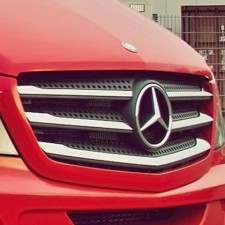









2005 Freightliner Sprinter here. Need assistance or a service manual.
Hi Jan,
Try here: http://sprinterwestfalia.com/2005-sprinter-service-manual/
Charlotte County Florida shut down highway. Locked down a neighborhood surrounding an RV Park. Brought in the MRAP. Marched the jackboots in a full military response to a domestic disturbance on 10/21/2014.
Charlotte FL RV park residents discuss deadly shooting
CHARLOTTE COUNTY FLORIDA SHERIFF WENT FULL NAZI, THEY EVEN GOT THEIR MRAP TANK OUT
2 dead after Charlotte RV Park love triangle standoff
– – –
That insult’s a compliment to come from a war monger like John McCain… I was lucky enough when I was president to keep our country at peace, and provide peace for others. I was lucky enough to go through my four years, we never shot a bullet or dropped a bomb or fired a missile. – Jimmy Carter
http://theantimedia.org/jimmy-carter-called-worst-president-better-warmonger/
Perhaps there is an opportunity to make an aftermarket console for between the front seats, and improve on what a factory setup could offer. I have seen a few of these vehicles in Australia.
Probably someone does!
In fact, I know someone does. I’ve seen a couple of RV conversions – and they’re the place to be for a cross-country road trip. Nicer than the first class lounge in a 747 … and no “security” bullshit to deal with.
eric, I see these fairly often. Some are obviously RV’s. If I could afford it I’d be fine having one as an RV since it’s not SO obvious and you could park in parking lots for the night and avoid high-priced RV rental spots since trying to maintain 3 at the same time is expensive to say the least. A bed large enough for CJ and myself, a nuclear wave, a fridge and a propane heater and you’re good to go. Install a 120V a/c and lots of construction companies and oil field related companies will let you hook up to their power.
We commonly build RV parks on permanent locations in the boonies. I think I’d just install a large inverter on the vehicle’s engine and not mess with a portable generator…..and then I’d have an emergency welder too.
I’ll never understand people who stay in those RV parks- it’s like The Grapes Of Wrath for retirees.
I’d guess 100% of all the new(and that would be probably in the hundreds)RV parks in this state are occupied by people working away from home. Every park I’ve stayed at was full of welders, truckers, pipeliners, electricians, equipment operators and the like. It’s fairly amazing how quiet these places are. Everybody comes in from at least a 12 hr day and simply cleans up, drinks to passing out and goes again the next early a.m. Sometimes only “extra” vehicles in the entire thing during the day unless there’s a spouse or two living there also. Most retirees couldn’t afford the rates these place have.
@8- How about a used U-Haul 26 foot cab over? Super tough box with a roll-up door already installed for those lazy summer evenings. Windows optional. Paint it white, make a real nice upholstered cozy cave inside and put “8’s Hazardous Waste Cleanup & Disposal” business stickers on the doors. Bet they will leave you alone in those Wal-Mart sleepover lots..
I’ve thought about same Garysco and have even seen such. White is a good color but anything that invites the DOT, NICS and Homeland Security is a bad move.
I’d bet they’d leave me alone everywhere once CJ does his “I’m the baddest dog you don’t want to see” sound.
Love these things! My dream vehicle! Considering what one pays these days for crappy little cars or a decent pick’em-up truck, the prices of these things doesn’t seem that bad. (Of course it’s more than I’d ever pay for transportation…)
I mean really- what’ll $35K get you in a car these days?
Check it out:
Two full-size motorcycles will fit, no problem. Plus a couch to sit on while you look at them. And a small fridge, too. What’s not to like?
eric, an alternative to this is the very similar Freightliner. They used to come with Benz diesels and probably still do. I’ve seen Fed Ex using the Freightliner with the Benz engines. The drivers love them so they tell me.
Yeah, UPS here has a Freightliner- the drivers do love ’em!
I’d be more than happy with the Freightliner, too. Long as it’s got A/C and the diesel, I’m happy- I don’t need or want all the other fancy Benz crap. If I were going to stay in this country, I’d definitely get one of these when used prices start getting below $10K.(Starting to see some around $10K, but they’re usually beat)
yep, I’d probably buy one if it weren’t wore plumb out. When I look into the Fed Ex job I see the shelving gone replaced by what I’d want including a small bath in the back. And a trailer turned into a bathroom wouldn’t break the bank either.
Actually if you go to the Benz and Freightliner websites, they appear to be the same except for the badging.
There’s no way I will be buying one of these unless I hit the lottery, and that’s hard to do when you don’t buy tickets. (You have to play to lose.) But I went to look at the website to satisfy the wife’s curiousity. I liked the look of the ‘Crew Van,’ with seating for 5 and vacant behind that. We do still have the back seats for her Grand Caravan, but given hauling feed, etc., they spend most of their time in the barn. The MPG on this diesel look comparable to the Mopar V-6 also.
Actually I never complain about not winning anything since I lost the Nixon/Laird lottery in 1970.
Airstream is using the Mercedes Sprinter chassis for its drivable RV’s.
I seem to be deleted again, the log in has disappeared from your site again………sure wish the computer business would try to increase reliability. Just in case you haven’t noticed yet.
Hi Rich,
Thanks for the heads up on the log-in issue. I wish I could afford a full-time tech support guy. I try to do the best I can with what I’ve got….
Winnebago is using the ProMaster chassis for a RV this year. Like all Winnies, the interior space is well designed and very useful. The exterior styling is a little odd, mainly because the headlights are so high off the ground.
So far as the Sprinter – it’s interesting that it’s back being a MB. When first introduced to the US, it was as a Mercedes. Then it became a Freightliner. After the “merger” (air-quotes) with Chrysler, it became a Dodge. And now it’s back to it’s origins.
I’ve seen several converted for use as handicapped transportation. It’s much easier to get a wheelchair lift installed on one than a minivan, it seems. And once inside, the flat cargo floor and tons of room means the chair is easy to position.
The Sprinter was one of the few things Chrysler gained out of its short-lived ‘merger’ with Daimler – only to lose it again when they were spun back off to Fiat.
But IIRC, it has always been available as an MB, even when it was also a Dodge.
Not sure of the timing, but Freightliner is now a div. of Daimler.
Daimler bought Freightliner in the late 90’s, IIRC. If you see some of their over the road trucks of that time, you may notice that they use the same headlight unit as the 1st generation Mercedes M-Class.
The RV conversions of the Sprinter make good weekend rigs, but I wouldn’t want to full-time in one. They typically have one of the Thetford cassette toilets – no black tank as a result, but you do have to take the cassette over to the dump station for emptying. They’ll have a shower, but it’s a “wet bath” where the toilet and sink are molded into the fiberglass enclosure. Also, no dedicated bed – the back bench seat folds down to form an (uncomfortable) bed.
And if, for some reason, you DON’T want the MB branding, the same van is available from your Freightliner dealer – or at least has been in the past. Just don’t expect a price break.